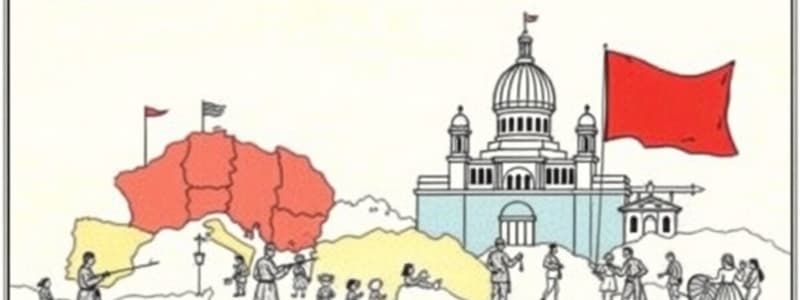Podcast
Questions and Answers
Why is it important to study significant individual figures and pivotal historical events?
Why is it important to study significant individual figures and pivotal historical events?
- They solely focus on military history.
- They contribute to interpreting the past. (correct)
- They discourage critical thinking.
- They provide entertainment for future generations.
What distinguishes primary sources from secondary sources in historical analysis?
What distinguishes primary sources from secondary sources in historical analysis?
- Primary sources are produced closer to the time of the event being studied. (correct)
- Secondary sources are first-hand accounts of events.
- Secondary sources are always more reliable than primary sources.
- Primary sources include analysis and interpretation.
How does understanding historical events and their influences help in comprehending current issues?
How does understanding historical events and their influences help in comprehending current issues?
- It emphasizes that current issues are entirely new and unique.
- It shows that history has no relevance to the present.
- It reveals how historical foundations shape contemporary factors. (correct)
- It diminishes the importance of political structures.
What does historical revisionism involve?
What does historical revisionism involve?
What types of societal shifts can historians study to gain insights into the past?
What types of societal shifts can historians study to gain insights into the past?
What aspect does political history primarily focus on?
What aspect does political history primarily focus on?
Which historical methodology involves evaluating the reliability of sources?
Which historical methodology involves evaluating the reliability of sources?
In what way does economic history analyze societies?
In what way does economic history analyze societies?
What defines intellectual history as a field of study?
What defines intellectual history as a field of study?
Which of the following focuses on the structure of societies and class divisions?
Which of the following focuses on the structure of societies and class divisions?
What is one key theme explored in military history?
What is one key theme explored in military history?
What is the significance of timelines in historical study?
What is the significance of timelines in historical study?
Which era is typically associated with advancements in science and philosophy?
Which era is typically associated with advancements in science and philosophy?
Flashcards
Historical Analysis
Historical Analysis
Examining past events to understand their significance and impact.
Primary Source
Primary Source
A firsthand account from the time period being studied.
Secondary Source
Secondary Source
A later analysis of primary sources.
Historical Revisionism
Historical Revisionism
Signup and view all the flashcards
Historical Impact
Historical Impact
Signup and view all the flashcards
Historical Methodology
Historical Methodology
Signup and view all the flashcards
Historical Perspective
Historical Perspective
Signup and view all the flashcards
Social History
Social History
Signup and view all the flashcards
Political History
Political History
Signup and view all the flashcards
Historical Narratives
Historical Narratives
Signup and view all the flashcards
Historical Eras
Historical Eras
Signup and view all the flashcards
Study Notes
Historical Periods and Concepts
- History encompasses the study of past events, societies, and cultures.
- It involves analyzing primary sources (original documents, artifacts) and secondary sources (interpretations and analyses of past events).
- Historical narratives are constructed through the selection and interpretation of evidence.
- Different historical perspectives may exist depending on the context and viewpoint.
Key Themes in History
- Political History: This focuses on the systems of governance, leaders, and political events throughout time, including wars, revolutions, and diplomacy.
- Social History: It explores how societies were structured, the roles of different groups, and social norms and values over time. It considers aspects like family structures, class divisions, and daily life.
- Economic History: This examines the production, distribution, and consumption of goods and services and how these economic systems have evolved over time.
- Cultural History: This investigates the beliefs, values, art, and customs of different cultures and societies throughout history, impacting their development and interactions.
- Intellectual History: It explores major ideas, philosophical movements, and scientific advancements, including their influences and implications for societies.
- Military History: This examines warfare, military strategies, technology, and its impact on societies and cultures.
Historical Methodology
- Historians employ various methodologies, including source criticism (evaluating the reliability of sources), contextualization (understanding events in their historical context), and interpretation (analyzing evidence to draw conclusions).
- Historians often use primary and secondary sources to support their analyses, including diaries, letters, government documents, and scholarly studies.
- Different historical schools of thought and perspectives influence how historians interpret and present events.
Historical Eras and Timelines
- Understanding significant historical eras is crucial for organizing and contextualizing events. Examples include the Ancient world, the Middle Ages, the Renaissance, the Age of Exploration, the Enlightenment, the Industrial Revolution, and the modern period.
- Historians use chronology and timelines to organize historical events, helping to understand the sequence and relationships between them.
- The importance of specific dates and events within each era for historical analysis should be considered.
Historical Figures and Events
- Studying significant individual figures and pivotal historical events contributes to interpreting the past.
- Examples include major political leaders, revolutionary figures, and influential thinkers. Important events, such as wars, revolutions, and moments of cultural change, are also crucial to understanding historical trends and consequences.
- Examining societal shifts, including technological advancements, social movements, and cultural transformations, offers further insights.
Historical Sources and Evidence
- Historians use various types of sources, both primary and secondary, to substantiate their analyses.
- Primary sources are first-hand accounts from the era being studied, such as letters, diaries, and official documents.
- Secondary sources, which are analyses of primary sources, provide various interpretations and perspectives.
- Historians critically evaluate these sources to determine their authenticity and accuracy.
Historical Impact and Legacy
- Understanding how historical events have influenced and shaped the present is important.
- Factors like political systems, social structures, and cultural norms often derive from historical foundations.
- Studying the historical context of present issues allows for a deeper comprehension of their causes and implications.
Historical Revisionism
- Historical revisionism is the act of reinterpreting historical events and their causes, often challenging existing established narratives.
- This process can involve using new evidence or re-evaluating past interpretations.
- Revisionism can lead to new understandings and broader perspectives, improving our knowledge of the past.
Studying That Suits You
Use AI to generate personalized quizzes and flashcards to suit your learning preferences.



